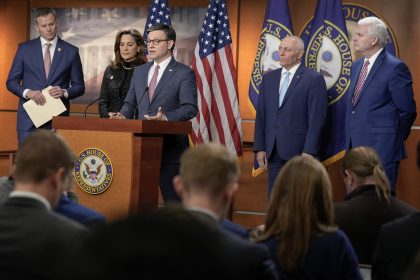Report Highlights Series of Proposals to Reverse Capitol Hill Brain Drain

WASHINGTON – In their recent report of Capitol Hill staffing issues, authors Alexandra Furnas and Timothy LaPira paint a harrowing picture of a culture that basically pushes its best resource — its people — to the private sector and away from public service.
But Furnas and LaPira do more than toss a scholarly hand grenade into the fray and run away.
They go on the New America-published tract to offer a number of possible solutions, some of them purely aspirational, they admit, but others imminently doable.
They are:
- Acknowledge bipartisan and bicameral institutional neglect. Members in both chambers—and in both parties—must acknowledge that the Congress they have inherited has less capacity to govern than that of only a decade or two ago. The bipartisan, bicameral problem demands bipartisan, bicameral cooperation to reinvigorate the legislative branch.
- Reorganize Congress. Congress has not seriously reconsidered how its rules, structure, and organization are outdated, inefficient, and inadequate for their constituents’ needs. Congress should authorize a bicameral, bipartisan, and simple majority-rule joint committee with sufficient resources to do more than merely recommend trivial improvements that existing standing committees and elected officers in each respective chamber are already considering.
- Pay staff more. The cost of living adjusted wages for entry- and mid-level congressional staff who work 50 hours per week or more is paltry for supposedly the most professional legislature in the world.
- Overhaul the MRA. The House of Representatives does not adequately manage member office operations. The MRA is not a meaningful strategic planning and budgeting tool, so it should be significantly restructured by first identifying overhead expenses in member personal offices that may be fully centralized, including basic information technology and routine office functions. The MRA should also structure a reasonable allowance for district and Washington personnel that accounts for local cost of living and health care benefits.
- Assess and reward high-performing offices. Members have little incentive other than their own reelection to change how they operate their offices. There should be routine mechanisms to reward offices for excellent performance, such as low turnover, long average tenure rates, professional development achievements, and other measurable objectives for service.
- Discard overall FTE and staff sharing limitations. Though the Senate does not necessarily pay staff more than the House after controlling for things like age and experience, the Senate does outperform the House in recruiting older, more experienced staff. The House could compete better if it no longer inhibited members’ flexibility in building the staff rosters they prefer.
- Restore balance to Washington and district work. The decades-long shift in staffing resources from Washington to the district is the consequence of much larger political forces in American politics, but it is not unrelated to how members’ use their official allowances.
- Members now face no limitation on how much they use taxpayer resources to conduct constituent services, most of which is for legitimate representation needs. But, Congress’s first priority is to govern, which requires members’ presence and attention while assembled in Washington.
- Allocating more resources to the “policy shop” is one way that members can assert their institutional prerogatives to influence legislation and oversight. This reallocation ought to be part of a comprehensive reconsideration of how members’ time in Washington is spent, such as reducing “call time” and reelection fundraising.
- Pay interns. The pipeline for working in Congress is fit only for those with sufficient privilege and resources to accept non-paying or extremely low-paying employment. Recent funds allocated for internships are a good start, but are not sufficient. Congress should rethink internships in congressional offices as public service apprenticeships.
- Centralize the legislative staff labor market process. Members of Congress exploit a race-to-the-bottom legislative staff labor market, and fail to recognize that their market extends beyond Capitol Hill.
- Both parties free-ride on the prestige of working in Congress by continuing to use informal networks to recruit and retain staff. Such informal networks are especially problematic for traditionally underrepresented groups.
- Proactively recruit, retain, and promote a diverse staff. Congressional offices should be rewarded for recruiting, retaining, and promoting staff to better represent women, people of color, and others who are not typically represented among staff. Congress should create a joint Office of Diversity and Inclusion, and go further to support efforts such as the Joint Center for Political and Economic Studies “Hill Diversity” initiative.
- Improve labor market transparency. Congress should develop routinely updated guidelines for pay, job title definitions, job descriptions, and occupational ranks and steps based on demonstrable knowledge, skills, and abilities.
- Slow the revolving door. Congress needs to offer staff a reason to stay, including a work environment that makes full use of their intrinsic public service motivation.
- Sponsor and reward professional development. Congress should partner with the political reform community, federal agencies, private sector organizations, staff affinity groups, universities, and think tanks to develop bipartisan professional development standards and expertise certification.
- Create a venue for staff to offer feedback. Staff—especially those who are young and junior—have very few opportunities to offer feedback without fear of retribution.























